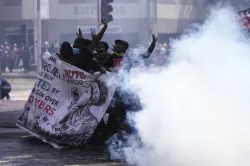EXPLAINED: What led Kenyans to burn part of Parliament and call for President's resignation?
Kenya's President came to power by appealing to the common people, describing himself as a “hustler” and vowing relief from economic pain. But Tuesday's deadly chaos in the capital, Nairobi, shows how far support for him has turned.

Kenya's President ascended to power by championing the cause of the common people, presenting himself as a "hustler" committed to alleviating economic hardships. However, the violent events on Tuesday in Nairobi illustrate a dramatic shift in public sentiment against him. Although he revoked his plans on Wednesday, his earlier agendas led to a chaotic event in the country.
During the chaos, part of parliament was set ablaze as protesters stormed in and lawmakers fled. Tragically, casualties were reported on the streets, with medical personnel and watchdog groups alleging that police fired upon demonstrators. The military was subsequently mobilized. The unrest stemmed from a youth-led movement's opposition to President William Ruto's government passing a finance bill, which they argued would exacerbate economic challenges for Kenyans. Despite widespread criticism, the bill was approved by lawmakers and is anticipated to be signed by Ruto, despite calls from religious leaders labelling it as "unjustified."
These developments mark a significant upheaval in East Africa's typically stable democracy and represent the most serious challenge to Kenya's government in decades.
From internet data to diapersThe finance bill aimed to increase or introduce taxes and fees on various essential items and services such as internet data, fuel, bank transfers, and diapers. As public outrage mounted, some of these measures were removed. These proposals are part of the Kenyan government's strategy to generate an additional $2.7 billion in domestic revenue.
Government officials argue that these changes are necessary to service national debt interest, reduce the budget deficit, and ensure ongoing governmental operations. However, protesters view them as punitive, especially given the existing high cost of living that already makes survival challenging. In 2023, another finance bill signed into law by President William Ruto included a controversial tax on housing salaries, but it did not provoke the level of unrest witnessed currently.
A youth-led protestYoung Kenyans have been mobilizing on social media to coordinate peaceful street protests aimed at pressuring authorities to withdraw the controversial finance bill. The demonstrations commenced on June 18, shortly after the bill was unveiled to the public. Beginning in Nairobi, the protests have since expanded to other regions of Kenya, reaching as far as Mombasa on the Indian Ocean coast and Eldoret in the Rift Valley, traditionally a stronghold of support for the president. In response to the contentious passage of the bill, Kenya's political opposition walked out of Tuesday's session in protest.
The President is questionedSince his election in 2022, President William Ruto has consistently emphasized the importance of all Kenyans paying their fair share of taxes. However, this stance has led some citizens to derisively nickname him "Zakayo," likening him to the biblical tax collector Zacchaeus. Many perceive his assertive approach as authoritarian and disconnected from the challenges faced by ordinary people. In 2023, when the courts intervened to block certain tax proposals, Ruto's response included threats to disregard court orders, a move that drew sharp rebuke from the Law Society of Kenya. The organization's leader accused Ruto of exhibiting a disregard for the rule of law.
Critics and pro-democracy activists have expressed concerns about Ruto's confrontations with the judiciary, warning that such actions reflect authoritarian tendencies. Some observers draw parallels between Ruto and his mentor Daniel arap Moi, the former president who governed Kenya during an extended period of one-party rule.
During his presidential campaign, William Ruto positioned himself as an anti-establishment candidate committed to implementing policies that would improve the financial situation of ordinary Kenyans. However, his government's decision to remove subsidies on essential items like fuel and maize flour left many of his supporters, known as "hustlers," feeling disillusioned and betrayed.
Despite his current wealth, Ruto frequently advises Kenyans to adopt austerity measures. Nevertheless, controversy arose during his state visit to the United States in May when he opted to charter a luxury private jet instead of using Kenya's presidential aircraft or the national carrier. Ruto later attributed the charter to unnamed friends who covered the expenses.
(With inputs from agency)
